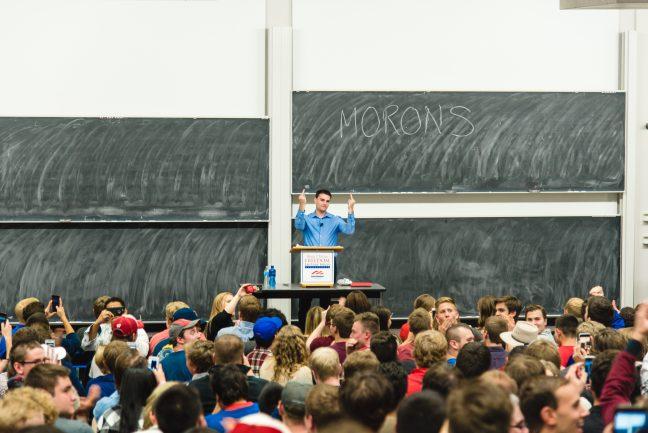In recent years, UW has seen several prominent, polarizing Republican personalities on its campus: Matt Walsh in October 2022, Ben Shapiro in November 2023, Michael Knowles in March 2024 and Charlie Kirk this September. To varying degrees, each visit has challenged students and administrators to assess controversial ideas and weigh the merits of free speech against the consequences of divisive rhetoric.
Walsh’s and Knowles’ presence at UW in particular sparked controversy over administrative actions that were seen by many on the right as politically motivated and led to protests by members of the left who considered the speakers’ presence on campus a tacit approval by UW administration of bigoted ideas.
Prior to Walsh’s visit, Young Americans for Freedom at UW President Harrison Wells criticized a twitter statement authored by Dean of Students Christina Olstad and Student Affairs Associate Vice Chancellor Gabe Javier — which acknowledged Walsh’s viewpoints as harmful to the trans community — as evidence of administrative bias.
Walsh’s visit to UW also resulted in extensive anti-Walsh graffiti and picketing around Memorial Union.
Knowles’ visit also drew scrutiny when UW imposed security fees in excess of $4,000 on YAF to host the event, which were later relieved after the conservative law firm Wisconsin Institute for Law and Liberty threatened to pursue legal action against UW for violating WYAF’s First Amendment rights, according to The Badger Herald.
During Shapiro’s speech in November, he criticized the university’s statement on the Oct. 7 attacks for their failure to condemn the acts of terror perpetrated by Hamas.
“We are reaching out to student organizations whose members may be particularly affected by the recent acts of violence in Israel and the Palestinian Territories,” the email statement began.
Kirk’s visit to campus as the first stop on his “You’re Being Brainwashed” tour was held on Library mall, and thus did not require any kind of collaboration from UW, but each of these cases has forced students and administrators to critically examine the first amendment and measure the weight of free speech.
The question of how to respond to highly polarizing speakers on campus has proven burdensome for administrators and students alike, but in each of the above cases, the speaker was ultimately able to complete their full length programs at UW. The same cannot be said for some of these speakers at other universities in the U.S., and their reception at UW speaks to UW’s commitment to upholding free speech on campus and students’ desire to host these speakers.
As UW stated in their follow-up to Walsh’s 2022 visit, protesting a speaker’s presence on campus is itself an exercise of the First Amendment. Doing so should not be regarded — as it often is by the right — as a dangerous attack on free speech.
If Kirk truly wanted to engage in thoughtful and elevating dialogue he would presumably not narrow his window of debate almost exclusively to college students and then lead with the assumption that these same students are brainwashed and unable to think for themselves.
Further complicating the challenge of measuring the validity of a speaker’s ideas is understanding their past. Walsh and Kirk have both made statements regarded by many as patently bigoted and hateful. Kirk faced backlash earlier this year for making a racist remark about Black pilots on his talk-show “The Charlie Kirk Show.”
“If I see a Black pilot, I’m going to be like, boy, I hope he’s qualified,” Kirk said.
Walsh has also made statements claiming that, as a parent, he’d rather be dead than have his child come as transgender.
This is not to say that a person should be barred from public discourse on account of statements they have made in the past, but it certainly complicates the picture so often painted by the right that young, liberal college students have developed an allergy to free speech.
Much in the same way that former Harvard president Claudine Gay faced immense pressure to resign just months into her presidency after stating that calling for the genocide of Jews did not violate Harvard’s code of conduct, people should be taken to task for what they say and not be given a free pass under the guise of protecting free speech.
In the end, it is up to the university as an academic, public institution to always be a platform for competing ideas, debate and free thought, not a regulator of these things. UW has no place sticking its nose in campus discourse and the recent change in policy headed by Chancellor Jennifer Mnookin to restrict the volume and extent of comments made by university administration regarding world affairs is a reasonable change.
The opinions of administrators should not be guiding principles of the student body. At the same time, students have every right to protest ideas and speakers that they deem indefensible, just as students have the right to extoll their beliefs and invite whoever they want to articulate those beliefs on campus. On both ends, this kind of participation in the pursuit of worthy ideas is a cornerstone of university life and the sifting and winnowing that UW so often champions.



